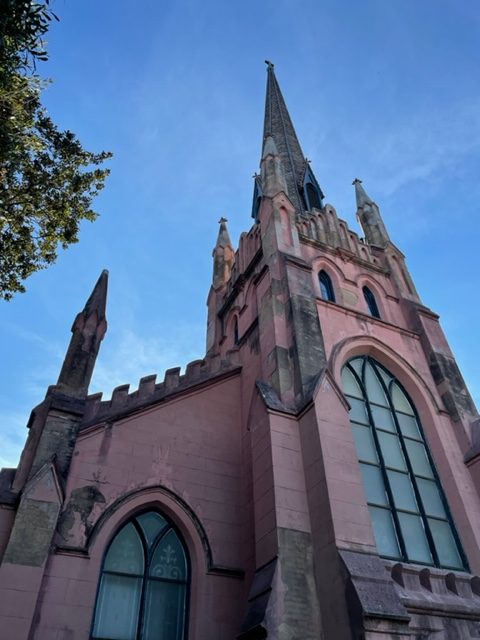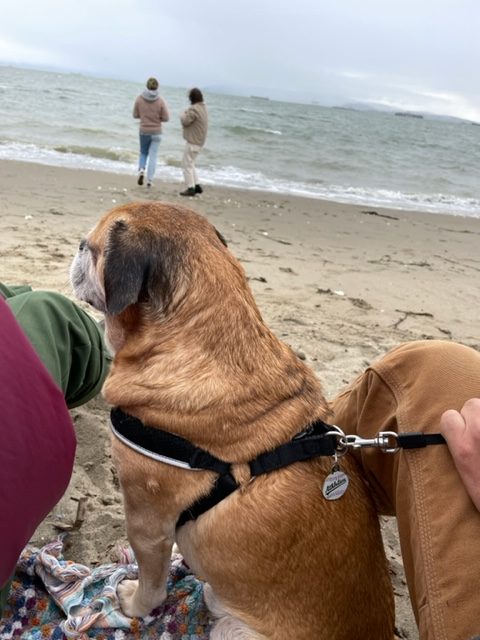Tracing the Dunns

We left Georgia and crossed into South Carolina at the Savannah River, where one finds the boundary line, today. I looked on the Native Lands map and it said we were in Muscogee lands. I imagine it was Muscogee land back in 1830 but at that time, the John Dunn family had a plantation, and under their possession they also had a small group of enslaved persons — a middle-aged woman, a younger man, and four children, whose names have been lost to time. The Dunns gave their name — or took possession of — the local creek that ran through their property. Dunn Creek is findable on Google maps and it helped me find the land that had been under the Dunn family for at least a generation. More research on Ancestry helped as well.
We meandered way out some backcountry roads in South Carolina to a small town called Edgefield, which was the Dunns’ town, and then out some further backroads until we found the creek. I scooped up a little of the red earth near the creek and I spoke aloud the story. I wish I could have said their names but the folks are not even remembered by name, only by category — like possessions, like species, not like people, not like breathing humans with hearts. It breaks me to know how we are connected and affected so. I will be speaking these people’s names where I can, as close as I can get to the places where they lived.

We went onward to Abbeville, where other Dunns lived and enslaved people. We are here for the night, in a haunted hotel. We walked around the town square, and of course there is a monstrous white obelisk singing the praises of the glorious Confederacy, as in so many Southern towns. But there’s also this new sign, from 2016, acknowledging the harm of lynching and naming those who had died by lynching in the past century. That is progress. Abbeville is where the first call for secession came from, and where the last meeting before declaring the war lost took place. There’s a place called Secession Hill and a Secession Street. I think they should change the names because THE SOUTH LOST THE WAR. There is no glory in losing. Because you were wrong. You lost. You’re done. Own up and grow up.
I’m kind of over it. I wish they were, too.
I’ve only seen one Confederate flag, however, all along our journey so far, and that is also an improvement. Last time I was in the South, 2015? Those flags were everywhere.
But the past is also present. There are signs in the walls, under our feet. Trinity Episcopal Church in Abbeville was built before the Civil War, and stood through it, and stands witness to how many racist abuses? How do you call yourself Christian and hate your brother?
And who built this church? Slaves.
Who paved the brick streets here? Who made the bricks? Who cut down the trees and cleared the roads and built the houses? Enslaved people. You can’t touch a thing here without the hand of an unfree person having smoothed it for you first. Abbeville was founded in 1764 by Huguenots who left France for what? Capitalism. Cotton, lumber, rice, whatever they harvested, it was by the blood, sweat and tears of enslaved folks who died doing the labor in the sultry, diseased air of the Carolinas. Yellow fever and malaria? A scented handkerchief won’t save you. Try and stay hydrated?
I sound a little bitter. I’m bitter about the way people were brought here, about how America continues to treat Black and POC, women especially, and how hard White folks have made it for the most basic of human dignities for anyone not a White dude (believe Black women! Help find Indigenous women!). It’s not a new gripe. I’m probably repeating myself. I’m outraged and inwardly seething and I’m wearing out good shoe-leather to see what I can dredge from the past and bring to light. Whatever it is.
Thanks for reading.




One Comment
Tim Brennan
Good essay.